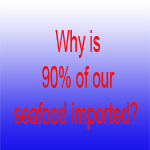While the grotesque unfairness of the legislated
ban on the sale of striped bass seems lost on the New Jersey Legislature,
it hasn't gotten by Molly Benjamin, a reporter for the Cape Cod Times and
an avid recreational fisherwomen.
[ to
the Seafood for Consumers section] to
the Seafood for Consumers section] |
Pretty soon, just after July 4, New Jersey residents vacationing on
Cape Cod get to do something they can't do at home.
Swim in clean water?
Nope, what we have in mind is something that's illegal in New Jersey,
but legal in Massachusetts.
In New Jersey, you can't go to a restaurant and order striped bass.
In a few weeks, you can easily get incredibly fresh striped bass at dozens
of Cape Cod restaurants.
Massachusetts allows the public to eat stripers. New Jersey doesn't.
Isn't that amazing?
I mean, it's not like New Jersey is landlocked. There are literally
billions of stripers swimming off the Jersey coast.
It's not that there's some crazy health advisory in effect. New Jersey
bass test out just fine.
It's not that Jersey fishermen are so stupid they can't catch a few
linesides. They, like their Massachusetts counterparts, will catch zillions
of the things this year. The ocean is full of 'em and we have the technology
- a rod, reel and baited hook.
The crazy thing is that New Jersey law prohibits selling or marketing
striped bass. They can't be sold, not for human consumption, not for anything.
(You can sell the right to catch a striper, though, via charterboats and
the like.)
In New Jersey, they've chosen not to plug into the American food chain
that starts with the harvester and end with a waiter flourishing a pepper
grinder over a fine plate of fresh fish.
So: The only people in New Jersey who can eat striped bass are those
with the time, inclination, money and access to catch one themselves.
(Well, I guess if you are neighbor to somebody who has all those things
down pat, you're handed off a fish once in a while too.)
Why?
New Jersey's army of sportfishers has convinced that state's legislature
to ban the sale of stripers. Period.
The result? The anglers get all the fish, all the time. Just them.
Boy, I feel like Rush Limbaugh. The Striper Nazis. Is this whacko, or
what?
There is simply no conservation reason for this law. None. Zippo. Bupkis.
Indeed, Rollie Schmitten, who until recently was the top fishery official
at the National Marine Fisheries Service, told Congress in 1997 that, "Our
information records go back to the 1880s. This year's science showed that
there are more striped bass now as at any time of the history of this nation."
If Rollie hadn't been laterally transferred, he'd be even more generous
this year. Folks, there's more stripers out there than you can shake an
Ugly Stik at.
So how come the Striper Nazis convinced the assembled delegates of the
great state of New Jersey to tightly allocate this wondrous fish of all
the people to such a small, privileged group?
The anglers have explained how much economic activity is generated by
keeping stripers a recreational-only kind of fish. It goes something like
this: Rod and other gear expenditures, $50 million; boat charters, $20
million; fuel, beer, grub, $120 million; motels and such, $230 million.
And so on.
It's sort of like banning the commercial sale of tomatoes, according
to Nils Stolpe, who heads up the Garden State Fishing Association. Compare
the two: The gardener spends lots on fertilizer, compost, manure, pesticides,
etc.; seed and plants; land costs; gas for the Volvo to drive to the supply
store; and so on, which makes most backyard-grown tomatoes worth about
$15 a pound.
This, versus the commercially-grown tomato available in the grocery
store where anyone can get one for, oh, 49 cents, available to everyone.
Stolpe says this is like trying to say we should all have to grow our own
tomatoes because they cost so much more, and that is somehow Good.
There's the fear-and-loathing-of-commercial-fishermen argument. Refer
to the popular press nonsense about "clear-cutting the ocean bottom," and
the like.
Then there's the notion of "greed." But - along the Atlantic States,
statistics show recreational fishermen take and kill about seven times
the stripers the commercial sector takes. Commercial anglers are licensed,
regulated, accounted for and kept tabs on; recreational anglers have no
licenses and little constraint. Well, there's minimum sizes and you can
only take one fish home a day; but there as here, you can catch them all
day long, til your arm grows weary, if you want - and many want. There
is a catch-and-release ethic much in vogue among most recreational anglers
and all Striper Nazis. Catch the fish, pet it awhile, and let it go. Bye-bye,
fishy.
Personally, I find catch-and-release a philosophically complicated thing.
I do it, most people do. I know that when trout fishing, chances are high
the trout lives to fight another day. Bass fishing is another thing; a
huge percentage of recreationally-released stripers die. Both the recreational
and commercial fishers end up with dead fish. Only the regulated commercial
harvest benefits the general public, which gets food. Good, healthy organic
food.
We would like to think that New Jersey's anglers real concern is conservation.
We'd like to think they have made serious effort to know the facts about
the fish they claim to "protect."
We'd like to think their arguments are not a lot of we-want-it-all,
quasi-conservation propaganda.
There are money-minded sportsmen behind that New Jersey law. They're
up here proselytizing in Massachusetts, by the way.
Scary, isn't it?
Molly Benjamin is a Times columnist. She can be reached via email: mbenjamin@capecodonline.com
|



